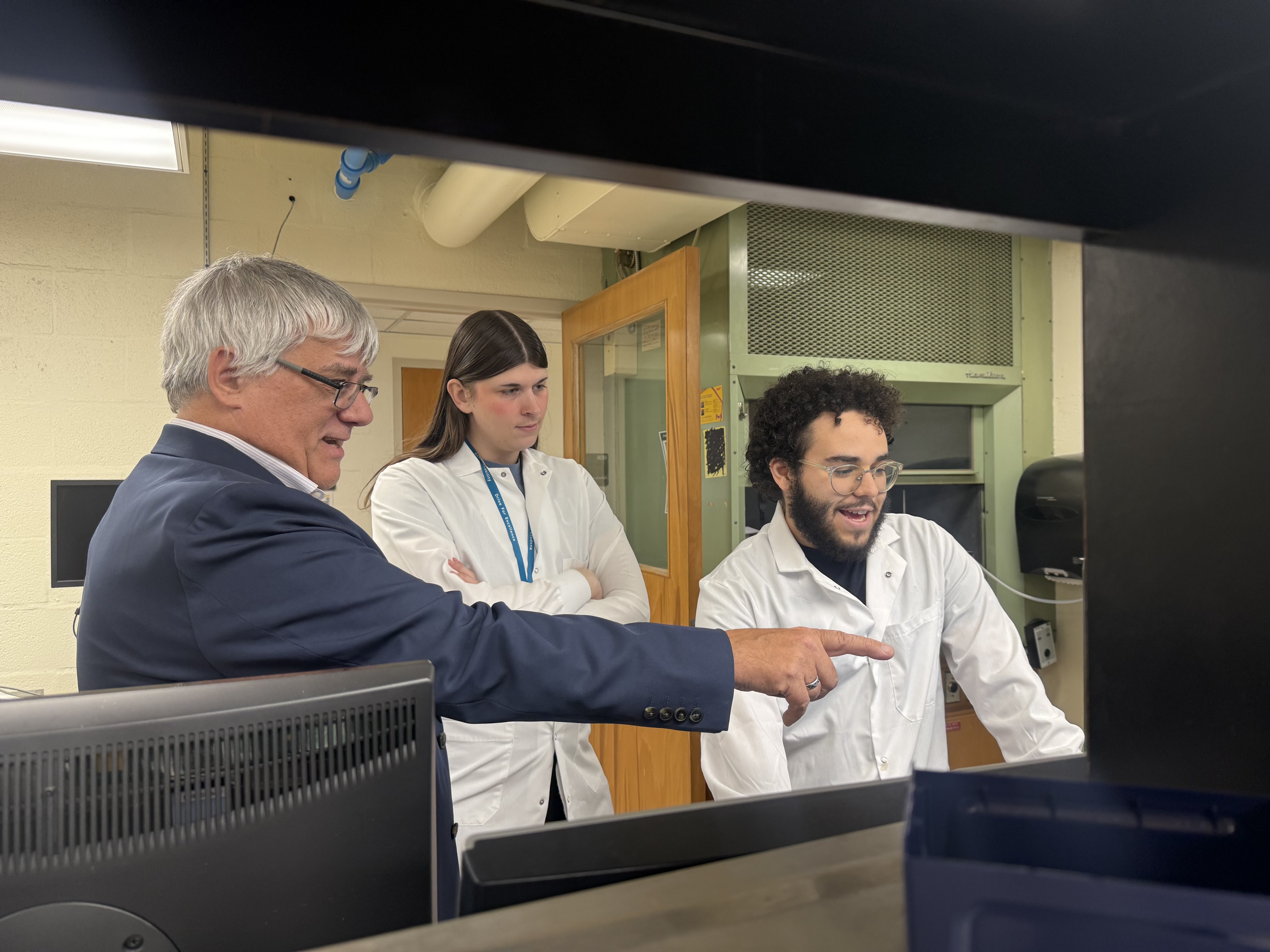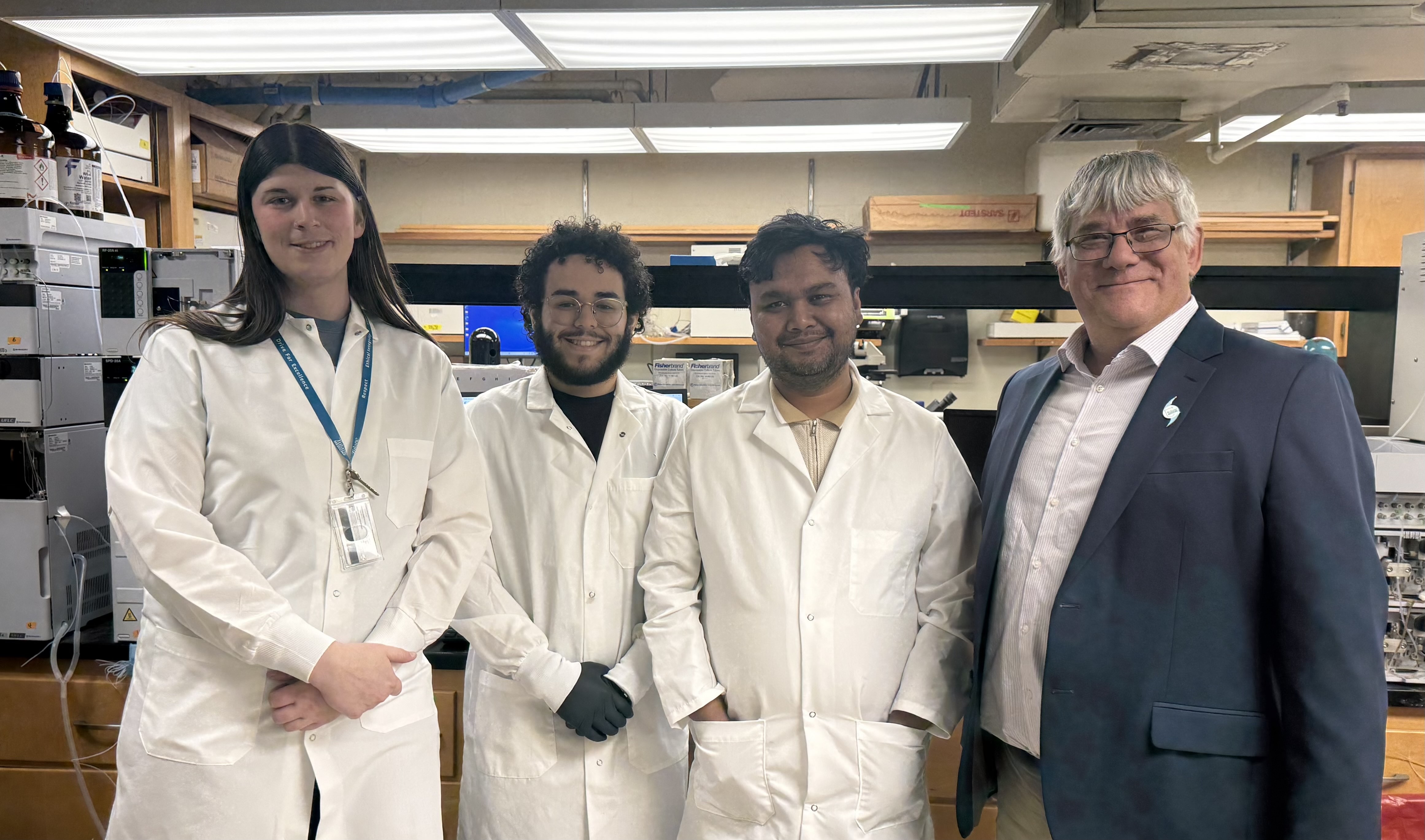Tulane Researcher Bill Wimley, PhD, Advances Peptide Therapies for Antibiotics, Drug Delivery, and Disease Treatment

Pictured from left to right: Bill Wimley with members of his lab, PhD students, Alaina Tait, and Adrian Taveras.
Peptides—once a niche topic in medical circles—are rapidly gaining attention in the health, wellness, and pharmaceutical industries. These short chains of amino acids, which serve as chemical messengers between cells, are now being marketed for everything from collagen production to treatments for chronic diseases. Their prominence has only increased with the rise of drugs like Ozempic, which rely on peptide-based compounds.
Interest in peptides at Tulane University is not new. Bill Wimley, the George A. Adrouny, PhD Professor in the Department of Biochemistry and Molecular Biology in the Tulane School of Medicine, has spent more than two decades studying the potential of synthetic peptides, focusing on antimicrobial therapies and advanced biomolecule delivery methods.
In the year 2000, Wimley began developing comprehensive libraries of peptides, meticulously documenting the behavior of each compound. This work led to the discovery of antibacterial peptides that can function effectively in whole blood without damaging human cells—an essential characteristic for targeting infections without harming surrounding tissues. One of these peptides shows promise in several infectious disease applications, including as a topical treatment for diabetic foot ulcers, a condition that can lead to amputation if left untreated. Early research indicates that this peptide may outperform traditional antibiotics, which often lose effectiveness as bacteria evolve resistance. The team is eager to bring their antibiotic peptide into human clinical trials. They are optimistic that these peptides may also effectively treat pulmonary infections, such as pneumonia and cystic fibrosis.
Wimley is also solving one of the fundamental hurdles in peptide- and protein-based medicine: delivery, as most can’t easily cross cell membranes. To solve this, Wimley turned to nature. Drawing on his fascination with wildlife—and his background in field biology—he studied melittin, a peptide found in honeybee venom known for its ability to pierce membranes. His lab modified its structure to create “nanopore peptides,” which remain inactive until they encounter acidic environments, like those in infections or tumors. Once triggered, they open channels into cells, delivering therapeutic cargo like proteins and antibodies without using viral vectors.
This innovation has led to multiple patents and has the potential to transform treatments for various diseases, including cancer and hemophilia. Wimley views these peptides as a more cost-effective and efficient alternative to current gene transfection methods and mRNA vaccine delivery. “The peptides offer a more efficient option for delivering the proteins needed for specific outcomes,” he explains.

Pictured from left to right: Alaina Tait, Adrian Taveras, Rayhanus Salam and Bill Wimley.
Wimley’s lab works closely with several partners, including Kalina Hristova, PhD, a materials science and engineering professor at Johns Hopkins University, whose research focuses on biological membranes. The two teams’ labs meet regularly via Zoom to accelerate their efforts toward clinical use. At Tulane, Wimley often collaborates with Lisa Morici, PhD, a microbiologist and immunologist, on his peptide research. They recently co-authored a journal article with multiple other researchers on developing antimicrobial peptides effective against biofilms and drug-resistant bacteria. This joint research included Kalen Hall of Informuta—a new Tulane University spinout leveraging machine learning to study antibiotic resistance.
Wimley is working with the Tulane Office of Intellectual Property Management and the Tulane Innovation Institute to bring these technologies a step closer to commercialization and find industry partners to license the technology. “The office has helped me understand how to communicate science and how my ideas can become intellectual property,” he said. “As scientists, we should all be thinking in those terms.”
As peptides continue to gain attention for their versatility and power, Wimley hopes that his lab work will move beyond academic journals and into medical and technology labs, hospitals, and homes.
To learn more about the research, innovation, and licensing opportunities at Tulane University, visit innovation.tulane.edu/industry.
